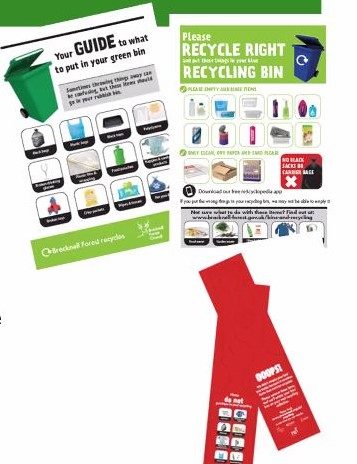Re3 has determined that a “gradual change” to policy thresholds may be the way forward in order to drive contamination rates down.
It comes in the wake of a contamination project which Re3, the waste partnership between Bracknell Forest, Reading and Wokingham borough councils and FCC Environment, ran for ten weeks starting from August 2020.
The findings from the project were reported in a webinar hosted by resources charity WRAP this morning (15 July).
The project ran for select properties in the Reading and Bracknell area, and consisted of a recycling quality officer and bin crews placing tags on contaminated recycling bins that would remain uncollected.
Residents were also sent letters if their bins remained contaminated.
In the webinar, Sarah Innes, monitoring and performance officer at Re3, reported that contamination is largely down to “resident habits”.
She said that overall the project resulted in a “improvement” in resident understanding, as they found it helpful to have a consistent approach in tackling contamination.
However she added that a more “gradual change” to policy thresholds may be more appropriate for areas with high contaminants as the project was quite “labour intensive”.
This was down to a higher workload for bin crews, as they actively looked for contamination, and the practice of sending out letters to residents.
‘Stringent’
David Moore, neighbourhood services manager at Bracknell borough council, explained that contamination policies implemented in the project were perhaps “too stringent”, as bin crews found it difficult to apply the policy after having set ideas as to what contamination was.
He added: “Some tagging of bins generated a response that residents didn’t like. Residents felt like they were exemplary recyclers as they had ideas already of what could be recycled, and they didn’t like being publicly shamed for not recycling.
“Residents didn’t like being publicly shamed for not recycling,”
“We were found that the crews and recycling quality officers also had a difference of opinions on what contamination was but that a gradual, continued dialogue between them and residents, started to change views.”
Findings
In Bracknell, the level of contamination during the project reduced from 11% to 8%, while in Reading, the reduction was 39% to 18%.
However, Ms Innes said that the larger decrease in Reading may have been down to the borough having a larger contamination rate to begin with.
She added that there statistically “wasn’t any change” in sampling at the Material Recycling Facility (MRF).
This was out down to the fact that recycling quality officers and bin crews were perhaps only looking at the top of bins, rather than further in.
Ms Innes added that residents may have “caught on” to the tagging system, and made sure that contamination was not visible at the top of the bin.
Rigid plastic
The webinar comes off the back of a rigid plastic recycling trial, announced by Re3 last week.
The trial will enable residents visiting re3 household waste recycling centres (HWRC) to recycle a variety of previously non-recycled rigid plastic items such as: plastic buckets, crates, bins, storage boxes, garden furniture, pipes, toys or plastic plant pots.
It is expected to last up to 6 months and, if successful it will be established as a permanent feature at both centres in Bracknell and Reading.
The post ‘Gradual approach’ best for contamination, Re3 says appeared first on letsrecycle.com.
Source: letsrecycle.com Waste Managment





